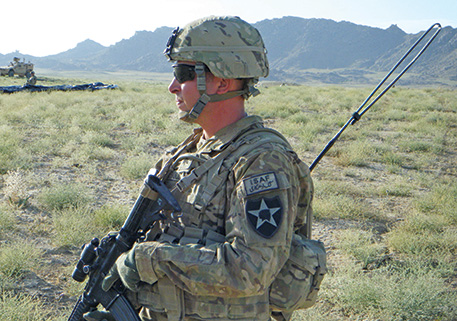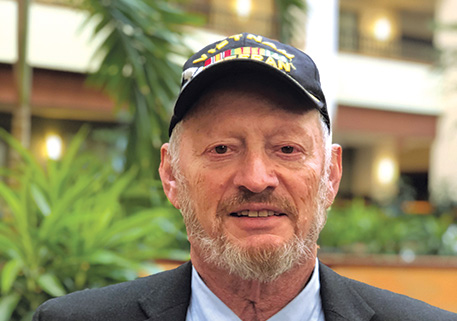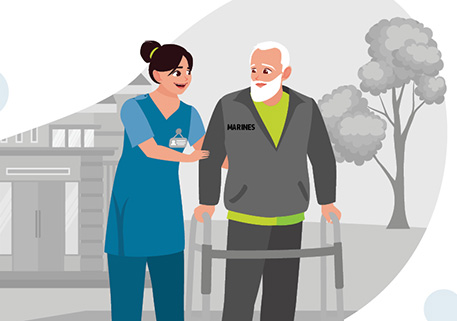Advocates converge in Washington to safeguard veterans benefits for current and future generations
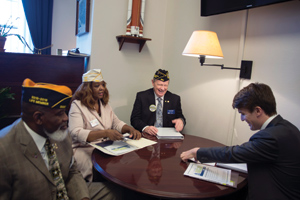
On any given day, the halls of congressional office buildings in our nation’s capital are abuzz with leading advocates of the many complex issues within American society. By design, this groundswell of civic participation makes it difficult for legislators and other policymakers to ignore the issues at hand. This is why hundreds of DAV’s most dedicated advocates from across the nation converged on Washington at the end of February—to press for needed change.
At the 2018 Commanders and Adjutants Association Mid-Winter Conference, DAV and Auxiliary members held dozens of meetings focusing on the organization’s numerous legislative priorities and advocacy efforts, including service improvements for women veterans and support for veteran caregivers of all eras, before taking DAV’s message to Capitol Hill and speaking directly with members of Congress and their staffs.
“At DAV, we talk a lot about keeping the promise to our nation’s veterans,” National Commander Delphine Metcalf-Foster reminded conference attendees at the opening session, held Feb. 25 in Arlington, Va. “This week is our opportunity to educate Congress and the administration on a smart approach to funding a strong VA that those of us in this room rely on.”
Metcalf-Foster pointed to the federal government shutdown that had already occurred just two months into 2018, largely due to partisan disagreements, as a cautionary tale before stressing to conference-goers that the organization’s advocacy efforts play an integral role in helping ensure veterans of all generations—past, present and future—have a system accountable to them for the injuries and illnesses sustained in service to the nation.
“We should be proud that, based largely on our efforts to ensure advance funding for the VA, most VA employees and services were exempt during shutdowns,” she said. “But the instability and rancor that seems to politicize every issue is a serious threat to the future of veterans care and benefits.”
National Adjutant Marc Burgess also noted the importance of DAV advocacy efforts.
“Your presence here helps put a face on veterans issues and shows lawmakers that their actions affect real people—real veterans—and their families each and every day. That personalization is extremely powerful, and you have always carried that message to the Hill, and your local communities, with passion and dedication. For that, DAV and your fellow veterans are profoundly grateful.”
Then-VA Secretary Dr. David J. Shulkin also addressed the conference at the opening session, updating members on reform efforts made at the VA since he took the department helm a year prior. Such efforts include improving timeliness of health care, extending mental health benefits to all veterans, preventing suicide, improving the VA’s disability benefits questionnaire, improving caregiver benefits, modernizing VA infrastructure and technology, speeding up veterans’ disability claims, reducing the claims backlog and fixing the appeals process.
Shulkin also noted the impact that DAV volunteers have made on VA Voluntary Service efforts, citing the National Disabled Veterans Winter Sports Clinic as a shining example of how volunteerism makes a difference in the lives of injured and ill veterans. The annual event, held in Snowmass, Colo., and co-hosted by DAV and the VA, is a world leader in adaptive winter sports instruction for veterans with disabilities.
“We just couldn’t be doing the work, helping the veterans around the country, if it wasn’t for all the volunteers that come out of your organization,” Shulkin said.
To further infuse excitement into the organization’s volunteer efforts, National Voluntary Services Director John Kleindienst unveiled a new web-based tool at the conference. VolunteerForVeterans.org links veterans from across the country with volunteers of all ages regardless of their connection to the veteran community. Nothing like it currently exists among other veterans service organizations, illustrating how DAV is innovating in the area of volunteerism in local communities.
“Opportunities are limitless,” Kleindienst explained. “Some examples are lawn care, raking leaves, going to the grocery store, sitting with a veteran who needs caregiver respite, reading a book, or just talking and interacting with someone—basically anything that can make a difference in the life of a veteran in need.”
“Volunteering and standing up for your fellow veterans, family members and survivors is a particularly meaningful commitment for we who have benefited from DAV’s services and those who have benefited from the joy that comes from giving a brother or sister hope,” Burgess added.
DAV also honored several dedicated veterans advocates throughout the conference for their outstanding efforts and achievements on behalf of the men and women who served.
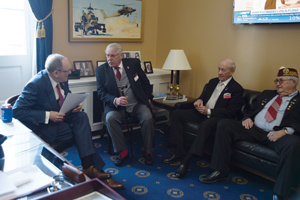

“The recipients of this year’s DAV Advocacy Awards have demonstrated what it means to keep the promise to the men and women who served,” said Metcalf-Foster. “They each possess an unmatched dedication to fighting for the best interests of veterans and their families. It is a great honor to present these awards that recognize their critical contributions in the areas of veterans health care, benefits, policy and legislation.”
Sen. Johnny Isakson, chairman of the Senate Committee on Veterans’ Affairs, received the Veterans’ Champion award; Sen. Tammy Baldwin received the Outstanding Senate Legislator of the Year award; Rep. Tim Walz received the Outstanding House Legislator of the Year award; and Thomas Murphy of the VA’s Veterans Benefits Administration received the Outstanding Federal Executive of the Year award.
Special recognition awards were also bestowed upon Dr. Elizabeth M. Yano, of the VA Greater Los Angeles Healthcare System, a career research scientist focused on women veterans health; Dahlia M. Melendrez, general counsel for the Senate Committee on Veterans’ Affairs; Raymond Kelley, minority staff director; Dr. Frances Murphy, who provides invaluable counsel on several DAV legislative campaigns and special initiatives; and Tom Philpott, a syndicated columnist, journalist and freelance writer.
The conference peaked on Feb. 27 when Metcalf-Foster testified before a special joint session of the Senate and House Committees on Veterans’ Affairs. Veterans and supporters packed the caucus room to maximum capacity in the Dirksen Senate Office Building for the hearing.
“I am grateful and humbled to be here in front of you as the first, but I am confident not the last, woman elected as national commander of our organization,” Metcalf-Foster stated at the beginning of her remarks before the joint committee.
The statement elicited a standing ovation from the audience and encapsulated one of DAV’s most dominant issues—women veterans.
“I’m inspired to lead again,” Dr. Lisa Kirk, a 22-year Air Force veteran and life member of Chapter 133 in Pompano Beach, Fla., said of her experience at the conference. “I feel like this organization allows us to have a level playing field to be leaders—not only to lead by example but to lead with empathy, because we understand what’s going on with each other.”
Metcalf-Foster noted the progress the VA has made in relation to women veterans over the course of the past few years but said more is still needed, including passage of the Deborah Sampson Act (S. 681/H.R. 2452), which would ensure all women using the VA have timely access to comprehensive, quality care that meets their unique health care needs.
The commander also spoke about a number of other issues during her testimony, including timely access to an integrated network of high-quality health care, and she called on Congress to fully fund veterans health care and other benefits.
“Some say our nation just can’t afford the rising costs of veterans benefits,” she explained. “We say that a great nation can’t afford not to pay for veterans benefits. These benefits have already been paid in full by the blood, sweat and sacrifice of men and women who served.”
Perhaps the most poignant element of her testimony, however, was the topic of family caregiver and support services, which Metcalf-Foster called “DAV’s highest legislative priority for 2018.”
“I personally know the sacrifice caregivers make,” she asserted before telling the story of her late husband, Jimmy, a fellow Army veteran who was diagnosed with Alzheimer’s disease and dementia.
“I was suddenly thrust into the role of a caregiver,” Metcalf-Foster explained. “I did my best to give him the support that he needed, but I also had to work, because we had limited income.
“As much as I wanted to keep my soldier home, his condition worsened, I grew older, and soon it was too much for me to handle. Sadly, my story is not unique. That’s why DAV launched its Unsung Heroes Initiative—to ensure all caregivers to severely disabled veterans have access to comprehensive caregiver benefits.”
She noted that while DAV is pleased the Senate Committee on Veterans’ Affairs voted to phase in caregiver assistance to severely injured veterans of all eras as part of the Caring for Our Veterans Act of 2017, our organization urges the full Senate and House “pass caregiver legislation for our most severely injured or ill veterans of all eras.”
In closing her testimony, Metcalf-Foster quoted Robert F. Kennedy, a Navy veteran and former senator and attorney general, who once said, “Every generation inherits a world it never made; and as it does so, it automatically becomes the trustee of that world for those who come after.”
“We are now the trustees,” Metcalf-Foster followed.
Kirk echoed this sentiment, reflecting on the significant contributions made to DAV by veterans of previous generations.
“I look at these Vietnam veterans, and I know I wouldn’t have any benefits if they hadn’t gone to Congress and actually changed the laws to protect disabled veterans,” she said. “So, if we don’t do it for the next generation, who will? We have to do it.”




